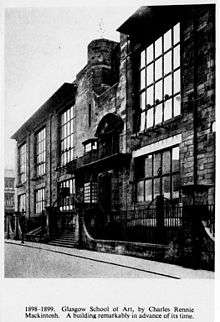Dorothy Carleton Smyth
Dorothy Carleton Smyth (Glasgow 1880 - Cambuslang, 1933) was a Scottish artist.
Early life and family
Smyth was born in Glasgow in 1880. She was born to Elizabeth Ramage and a jute manufacturer, William Hugh Smyth.[1] Her parents originated from France and Ireland, respectively.[2] Despite the family moved to Manchester in the 1880s, Smyth returned to Glasgow to study, as did her sister.[2] Smyth had two sisters; Olive (1882-1949) was also a Glasgow artist while Rose was a composer.[3] Smyth lived with her sisters for much of her life.[4]
Education

Between 1885-1893 Smyth attended the Colonel Clark's School in Manchester and the Manchester High School for Girls.[5] She studied under Walter Crane at the Manchester School of Art between 1893–97,[5] and at the Glasgow School of Art between 1898 -1904. At the latter she studied drawing, painting and stained glass but focused mainly on theatre and costume design.
Career
In 1901 Smyth's stained glass window Tristan and Iseult was exhibited at the Glasgow International Exhibition. Following her graduation from the Glasgow School of Art she worked in theatre in Stockholm, Paris and London.
In 1921, aged 41, she painted Self Portrait. This piece shows her in her studio with brushes, canvas and paint palette, and smiling at the onlooker. Olive Carleton Smyth presented the painting to Glasgow Museums in 1948.[4]
In 1903 an anonymous donor allowed her to travel in Florence and Paris, having earlier paid for her to be a member of the Glasgow Society of Lady Artists in 1902. She regularly exhibited with this group, as well as exhibiting with her dealer Craibe Angus.[1]
In 1903, she was commissioned by Glasgow dealer Craibe Angus to exhibit in Turin, Cork, Toronto and Budapest.[1] In 1914, she returned to GSA to teach, and became head of the Commercial Art Department, in which position she remained until 1933. Smyth's sister Olive taught fashion. She was highly praised and supported by Fra Newbury. Her circle has posthumously been described as the 'Glasgow Girls' group of artists.[6]
Smyth also designed costumes for a number of Shakespearean festivals in Stratford.[7]
In 1933, Smyth was offered the position of Director of the Glasgow School of Art, which she accepted. However she died on 16 February that same year. W.O. Hutchinson took up the role instead and Smyth's sister, Olive, took up the position of Head of Design at GSA.[5]
Gallery
 Costume design fro Donalbain.
Costume design fro Donalbain..jpg) Costume design for Macduff, from Shakespeare's Macbeth.
Costume design for Macduff, from Shakespeare's Macbeth. Costume design for Lennox, from Shakespeare's Macbeth.
Costume design for Lennox, from Shakespeare's Macbeth..jpg) Costume design for the English Doctor, from Shakespeare's Macbeth.
Costume design for the English Doctor, from Shakespeare's Macbeth..jpg) Set design for the English King's palace, from Shakespeare's Macbeth.
Set design for the English King's palace, from Shakespeare's Macbeth.
References
- Burkhauser, Jude (ed.). 'Glasgow Girls' Women in Art and Design 1880-1920. Canongate.
- GRAY, SARA. (2019). BRITISH WOMEN ARTISTS : a biographical dictionary of 1,000 women artists in the british... decorative arts. [S.l.]: DARK RIVER. ISBN 978-1911121633. OCLC 1085975377.
- Cumming, Elizabeth (2007). Hand, heart and soul : the arts and crafts movement in Scotland. Edinburgh: Birlinn. p. 60. ISBN 9781841586106.
Dorothy...who had also worked for Chivers, and her sister Olive (1882-1949) led classes in sgraffito and gesso plaster working.
- Strang, Alice (2015). Modern Scottish Women: Painters and Sculptors 1885-1965. ISBN 9781906270896.
- "Smyth, Dorothy Carleton (1880-1933) | GSA Archives". www.gsaarchives.net. Retrieved 23 January 2016.
- Elizabeth Ewan; Sue Innes; Sian Reynolds (2006). The Biographical Dictionary of Scottish Women: From the Earliest Times to 2004. Edinburgh University Press. pp. 136–7. ISBN 978-0-7486-1713-5.
- ABACUS, Scott Graham -. "TheGlasgowStory: Dorothy Carleton Smyth". www.theglasgowstory.com. Retrieved 23 January 2016.